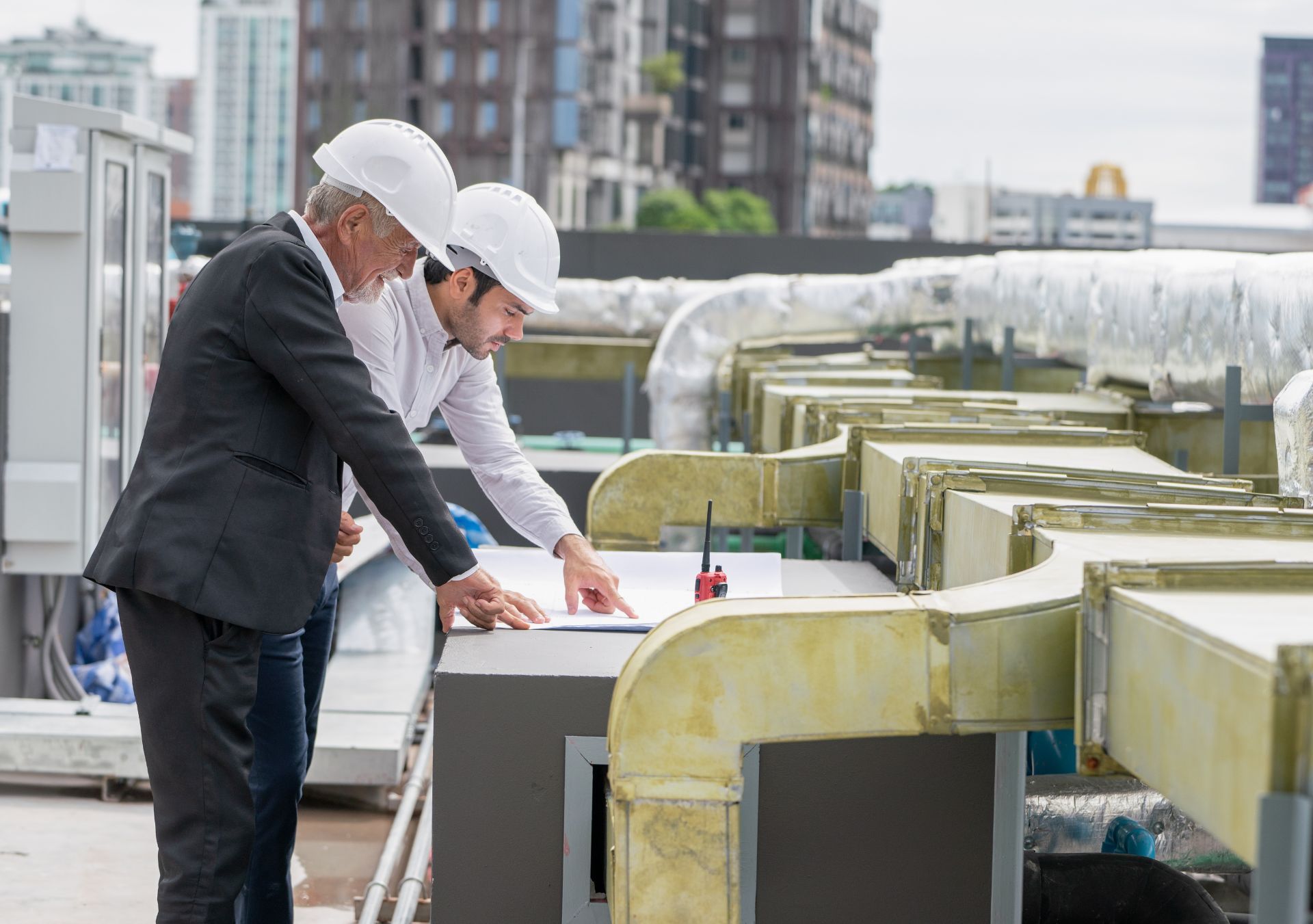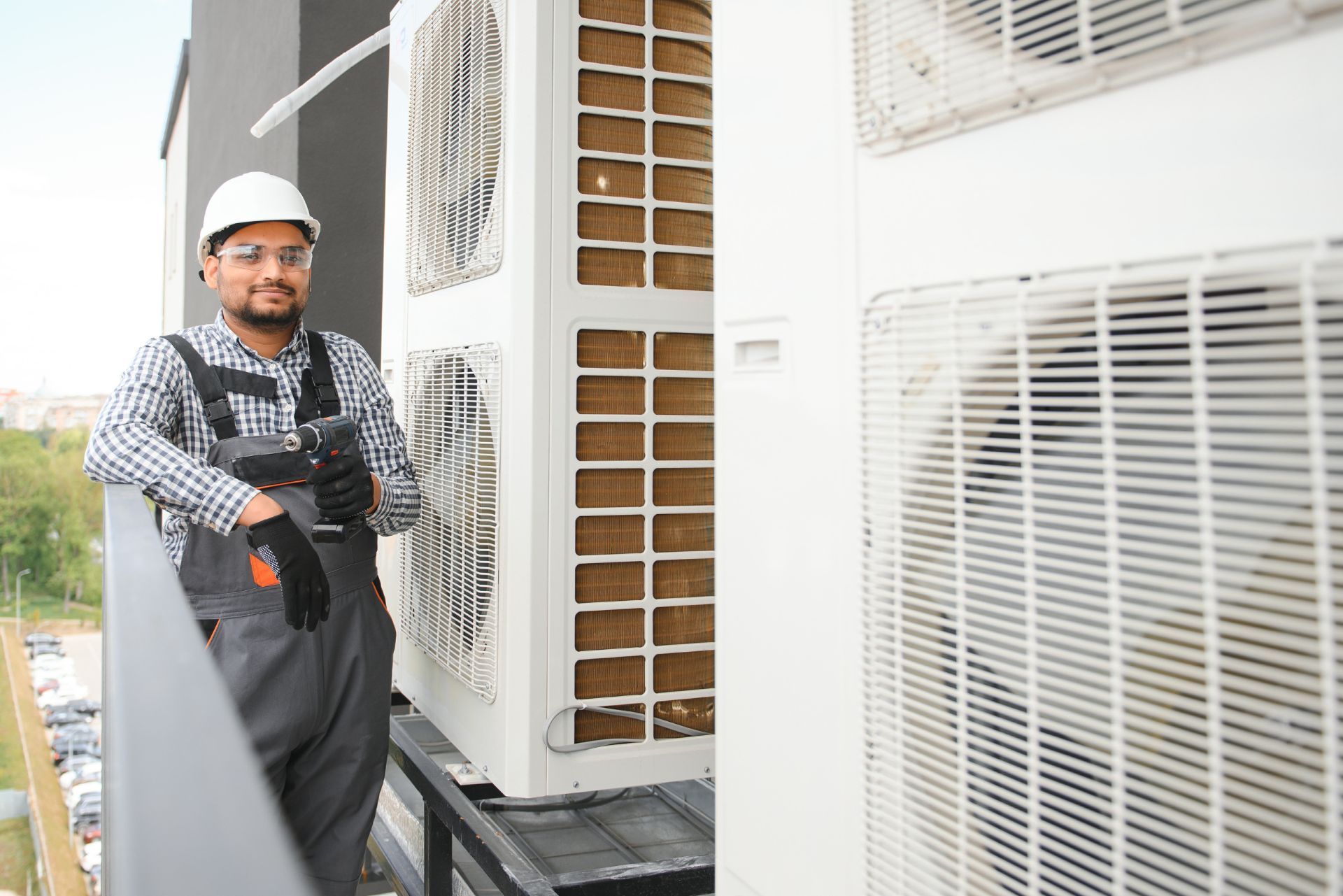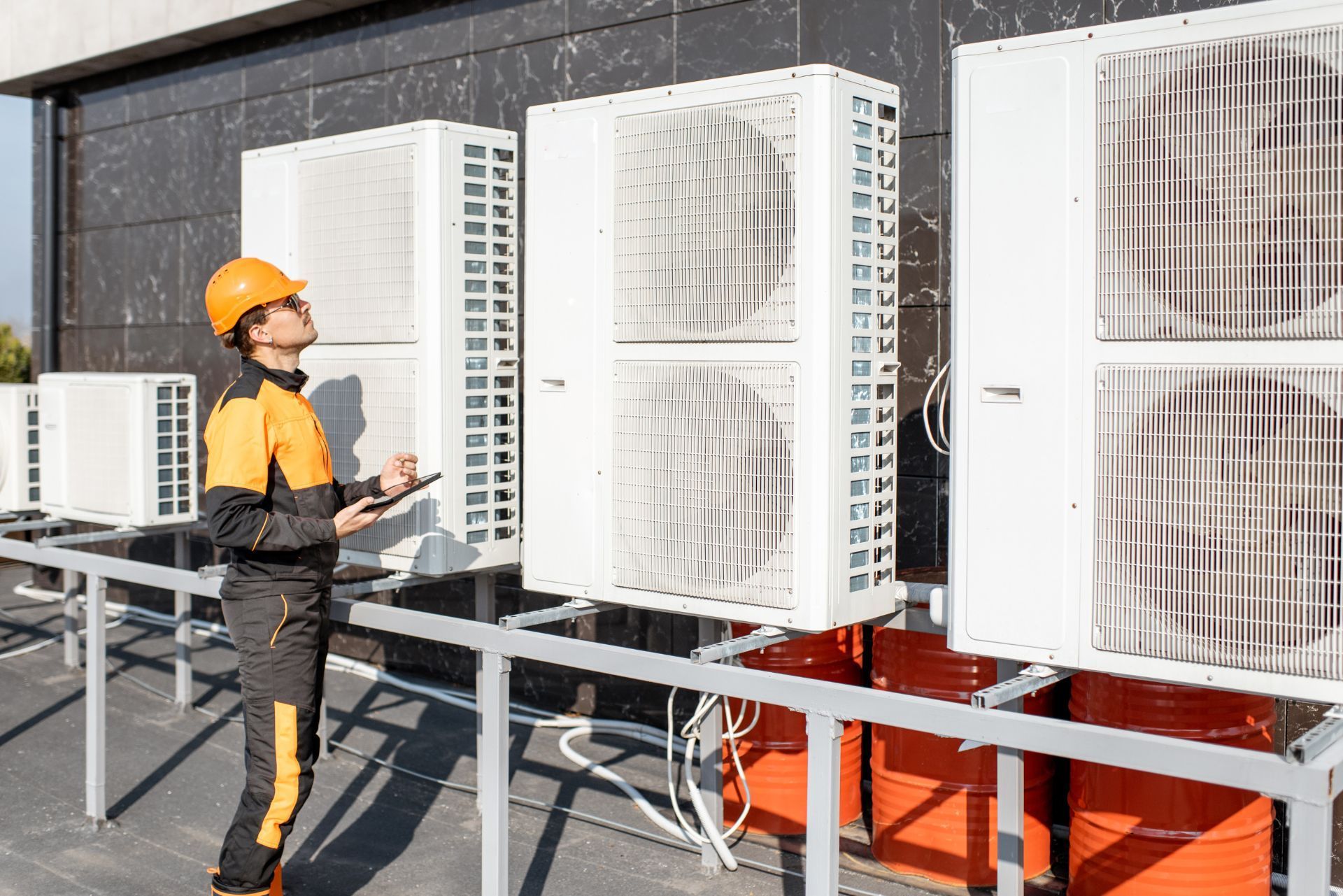Arizona Commercial HVAC Contractor Insurance
See How We're Different:
or Call Us:(480) 526-3222

Most Common Business Policies
Index
The rowing Arizona Commercial HVAC Industry and Its Risks
Key Insurance Coverages for Arizona Commercial HVAC Contractors
Understanding Insurance Costs and How to Save
Regulatory and Licensing Considerations in Arizona
Why Commercial HVAC Contractors in Arizona Need Specialized Insurance
Tips for Choosing the Right Insurance Provider
Conclusion: Protecting Your Arizona Commercial HVAC Business
Contact Us
Arizona’s Heating, Ventilation, and Air Conditioning (HVAC) industry is booming, driven by the state’s extreme climate and rapid urban growth. For commercial HVAC contractors in Arizona, securing the right insurance coverage is not just a regulatory formality—it’s a critical business safeguard. This comprehensive guide explores everything commercial HVAC contractors need to know about insurance in Arizona, from industry trends and risks to coverage options and cost-saving strategies.
With the Heating & Air-Conditioning Contractors industry in Arizona projected to reach $3.4 billion by 2025, encompassing over 2,600 establishments and 14,000 employees, understanding insurance requirements has never been more important (IBISWorld).
The Growing Arizona Commercial HVAC Industry and Its Risks
Arizona’s HVAC sector is expanding rapidly, fueled by both residential and commercial demand. Kristin Gubser, Vice President of Workforce Development at Gateway Community College, highlights the industry’s broad scope, which includes everything from home air conditioning units to large commercial buildings, manufacturing plants, hospitals, and schools (Arizona PBS).
This growth, however, comes with increased exposure to risks. Commercial HVAC contractors face challenges such as property damage, bodily injury claims, equipment failure, and liability from complex installations. Additionally, recent developments in Arizona’s construction and insurance landscape have heightened the stakes. For example, in June 2025, builders-risk deductibles for wood-frame construction jobs surged by 20% statewide due to a spike in fire losses, underscoring the importance of comprehensive risk management (Inszone Insurance).
Moreover, Maricopa County has seen verdicts exceeding $5 million in contractor liability cases, pushing insurance carriers' loss ratios above 70%. This trend contributes to rising insurance premiums, making it essential for contractors to carefully evaluate their coverage and risk mitigation strategies (Inszone Insurance).
In addition to these financial risks, the HVAC industry in Arizona is also grappling with a significant labor shortage. As the demand for skilled technicians grows, many companies are struggling to find qualified workers to meet the needs of their expanding operations. This shortage not only affects the quality of service provided but also places additional pressure on existing employees, who may face increased workloads and stress. Educational institutions, like Gateway Community College, are ramping up their training programs to address this gap, emphasizing the importance of hands-on experience and up-to-date knowledge of emerging technologies in HVAC systems.
The rapid evolution of technology within the HVAC sector is another critical factor influencing the industry. Innovations such as smart HVAC systems that integrate with building management software are becoming increasingly popular, allowing for greater energy efficiency and improved indoor air quality. However, these advancements also bring new challenges, including the need for specialized training and the potential for cybersecurity risks. As contractors adopt these technologies, they must remain vigilant about the implications for both their operations and their clients’ safety, ensuring that they are well-prepared to navigate this complex landscape.

Key Insurance Coverages for Arizona Commercial HVAC Contractors
Commercial HVAC contractors must navigate a complex insurance landscape tailored to the unique risks of their trade. The following coverages are critical components of a robust insurance portfolio:
General Liability Insurance
This coverage protects contractors against third-party claims of bodily injury or property damage arising from their work. Given the hands-on nature of HVAC installations and repairs, general liability is a foundational policy for any contractor. It not only covers legal fees and settlements but also provides peace of mind, allowing contractors to focus on their projects without the looming threat of lawsuits. In an industry where accidents can happen unexpectedly, having this coverage can be the difference between a thriving business and a financial disaster.
Commercial Property Insurance
Protecting tools, equipment, and physical assets, commercial property insurance covers losses from fire, theft, vandalism, and natural disasters. With Arizona’s recent increase in fire-related deductibles, this coverage is especially vital. Contractors often invest heavily in specialized equipment and inventory, making it crucial to safeguard these assets. Additionally, this insurance can cover loss of income due to business interruption, ensuring that contractors can maintain their financial stability even when unforeseen events disrupt operations.
Workers’ Compensation Insurance
Arizona law requires most employers to carry workers’ compensation insurance, which covers medical expenses and lost wages for employees injured on the job. HVAC work involves physical labor and potentially hazardous environments, making this coverage indispensable. Beyond legal compliance, providing workers’ compensation fosters a culture of safety and trust within the workforce. By ensuring that employees are protected, contractors can enhance morale and productivity, ultimately benefiting their business in the long run.
Commercial Auto Insurance
Many HVAC contractors operate service vehicles. Commercial auto insurance covers liability and physical damage related to these vehicles, protecting against accidents and theft. Given the nature of the work, where vehicles are often transporting heavy equipment and tools, this coverage is essential. It not only protects the contractor’s investment in their vehicles but also shields them from potential liabilities arising from accidents that may occur while on the job. Furthermore, having a reliable commercial auto policy can enhance a contractor's reputation, as clients often prefer to work with businesses that demonstrate responsibility and professionalism.
Professional Liability Insurance
Also known as errors and omissions insurance, this protects contractors against claims of negligence or faulty workmanship. Given the technical expertise required in HVAC design and installation, this coverage can shield contractors from costly lawsuits. In an industry where precision is key, even minor oversights can lead to significant issues, making this insurance a wise investment. Moreover, it allows contractors to confidently offer their services, knowing that they have a safety net in place should a client dispute arise over the quality of work performed.
Builders Risk Insurance
For contractors involved in new construction or major renovations, builders risk insurance covers property damage during the building phase. The recent 20% increase in builders-risk deductibles in Arizona highlights the importance of this coverage for HVAC contractors working on wood-frame projects (Inszone Insurance). This policy not only protects against damage from fire, theft, or vandalism but also addresses risks associated with weather-related incidents, which can be particularly relevant in Arizona's diverse climate. As contractors often work on multiple projects simultaneously, having builders risk insurance ensures that they can manage the financial implications of any unforeseen setbacks, allowing them to maintain their schedules and commitments to clients without undue stress.
Understanding Insurance Costs and How to Save
Insurance premiums for HVAC contractors in Arizona reflect the industry’s risk profile and recent market trends. According to a study analyzing over 1,100 HVAC liability insurance quotes, premiums typically range from 1.3% to 2.6% of annual gross revenue. However, contractors can achieve significant savings—between 38% and 73%—by actively comparing quotes and tailoring coverage to their specific needs (Contractor Nerd).
Factors influencing insurance costs include the size of the business, number of employees, types of projects undertaken, claims history, and geographic location. For example, contractors operating in metro areas like Phoenix, Tucson, and Scottsdale may face different risk profiles and premium rates compared to those in rural regions (Contractors Choice Agency).
Given the rising insurance costs driven by large verdicts and increased fire losses, it’s crucial for contractors to work with knowledgeable insurance agents who understand the HVAC sector and can help identify discounts, bundling options, and risk management practices that reduce premiums. Additionally, implementing safety training programs and maintaining a solid safety record can further enhance a contractor's profile, potentially leading to lower insurance costs. By prioritizing employee training on equipment handling and safety protocols, contractors not only protect their workforce but also demonstrate to insurers their commitment to risk management.
Moreover, the nature of HVAC work often involves seasonal fluctuations, which can impact cash flow and insurance needs. Contractors should consider reviewing their policies regularly, especially during peak seasons, to ensure that they have adequate coverage without overpaying. Engaging in proactive risk assessments and keeping abreast of industry changes can also provide contractors with a competitive edge, allowing them to negotiate better terms with insurers. Understanding the nuances of their specific coverage options, such as general liability and workers' compensation, can empower contractors to make informed decisions that align with their business goals.
Regulatory and Licensing Considerations in Arizona
Arizona’s construction industry is one of the largest in the state, with over 180,000 licensed contractors generating $15.8 billion in annual revenue. HVAC contractors must comply with state licensing requirements, which often include proof of insurance coverage before permits are issued (Contractors Choice Agency).
Maintaining proper insurance not only ensures legal compliance but also enhances credibility with clients and protects against financial losses from lawsuits or accidents. Contractors should regularly review their policies to ensure they meet evolving regulatory standards and adequately cover new types of projects or equipment.
In addition to insurance, HVAC contractors in Arizona must also be aware of the specific licensing classifications that pertain to their work. The Arizona Registrar of Contractors categorizes licenses into different classifications based on the scope of work, such as residential, commercial, or specialized systems. This classification system helps to ensure that contractors possess the necessary skills and knowledge to perform their tasks safely and effectively. Furthermore, contractors are required to complete continuing education courses to stay current with industry standards and technological advancements, which can significantly enhance their expertise and marketability.
Moreover, the regulatory landscape in Arizona is continuously evolving, influenced by factors such as environmental concerns and energy efficiency mandates. For instance, recent legislation has introduced stricter guidelines for HVAC systems to promote energy conservation and reduce carbon footprints. Contractors must stay informed about these changes and adapt their practices accordingly, as non-compliance can lead to penalties or loss of licensure. Engaging with professional associations and attending industry seminars can provide valuable insights into these regulatory shifts and help contractors remain competitive in a rapidly changing market.

Why Commercial HVAC Contractors in Arizona Need Specialized Insurance
HVAC contracting is a specialized trade with unique risks that general contractor insurance policies may not fully address. From handling refrigerants and complex electrical systems to working in confined spaces and at heights, HVAC contractors face hazards that demand tailored insurance solutions.
Moreover, Arizona’s climate—with scorching summers and occasional wildfires—adds environmental risks that can impact HVAC systems and contractor operations. Insurance policies designed specifically for HVAC contractors provide coverage options that reflect these realities, such as protection against equipment breakdown and pollution liability.
Industry experts like Jeremie Strother, Commercial Insurance Specialist at Inszone Insurance Services, emphasize that rising loss ratios and costly verdicts in Maricopa County have made specialized insurance more critical than ever. Contractors who invest in comprehensive, customized insurance coverage are better positioned to withstand claims and continue growing their businesses (Inszone Insurance).
In addition to the physical risks associated with the HVAC trade, there are also legal and regulatory challenges that contractors must navigate. Arizona's stringent regulations regarding refrigerant handling and emissions require HVAC contractors to stay informed and compliant. Failure to adhere to these regulations can result in hefty fines and legal repercussions, making it essential for contractors to have insurance that covers legal defense costs and penalties associated with regulatory violations. This specialized insurance not only protects against financial losses but also helps maintain a contractor's reputation in a competitive market.
Furthermore, the increasing reliance on advanced technology in HVAC systems introduces another layer of complexity. As systems become more integrated with smart technology, contractors must be prepared for the risks associated with cyber threats and data breaches. Specialized insurance policies can offer coverage for cyber liability, ensuring that contractors are protected against potential losses resulting from unauthorized access to sensitive customer information or operational data. As the industry evolves, having insurance that adapts to these changes is crucial for long-term success and sustainability.
Tips for Choosing the Right Insurance Provider
Selecting an insurance provider that understands the HVAC industry and Arizona’s market conditions is essential. Contractors should look for insurers with a proven track record in commercial HVAC coverage and the ability to offer competitive rates without sacrificing coverage quality. It's important to assess the insurer's financial stability and customer service reputation, as these factors can significantly impact the claims process and overall satisfaction. Reading reviews and seeking recommendations from fellow contractors can provide valuable insights into which providers are most reliable and responsive.
Working with agents who provide personalized service and risk management advice can help contractors identify gaps in coverage and implement safety protocols that reduce claims. Additionally, regularly reviewing and updating policies ensures that coverage keeps pace with business growth and changing industry standards. Engaging in ongoing training and education about emerging technologies and best practices in HVAC can also empower contractors to make informed decisions about their insurance needs. This proactive approach not only enhances safety but can also lead to potential discounts on premiums as insurers recognize the commitment to risk management.
Finally, contractors should leverage resources such as industry reports and expert insights to stay informed about insurance trends and regulatory changes affecting their coverage needs. Networking with industry associations and attending trade shows can provide opportunities to learn from experts and peers alike. Furthermore, understanding the nuances of different insurance products, such as general liability, workers' compensation, and equipment breakdown coverage, can help contractors tailor their insurance portfolio to better fit their unique operational risks and business model. By taking these steps, contractors can ensure they are not only adequately protected but also positioned for success in a competitive marketplace.
Conclusion: Protecting Your Arizona Commercial HVAC Business
As Arizona’s commercial HVAC industry continues to expand, contractors face increasing risks and rising insurance costs. Understanding the types of insurance coverage available, the factors influencing premiums, and the importance of specialized policies is vital for protecting your business and ensuring long-term success.
By staying informed about market trends, working with experienced insurance providers, and actively managing risks, Arizona HVAC contractors can secure the coverage they need at competitive rates. This proactive approach not only safeguards assets and employees but also builds trust with clients in a competitive industry.
For more information on the industry’s growth and insurance considerations, visit
IBISWorld’s Arizona HVAC industry report and explore expert insights from
Arizona PBS.
